|
During an on-stage interview recorded in 1994 and included on Indicator's dual format release of Ghosts of Mars, director John Carpenter is asked by a member of the audience if he would like to have directed Interview with a Vampire, to which he responds with an emphatic "No." The principal reason he gives is that, in his view at least, there was little mileage left in the vampire sub-genre, which by this point had effectively exhausted all variations on a story that had been endlessly recycled since the earliest days of cinema. A few years later I was expressing similar sentiments, only to then be forced to swallow my words by the release of Tomas Alfredson's Let the Right One In. And the very title and subject matter of Carpenter's film suggest that he then had a serious change of heart, what appears to have attracted him to the project was the chance to make a western in vampire clothing, which just happens to be the very same thing that drew Kathryn Bigelow to make her own distinctive vampire movie, Near Dark.
Jack Crow (James Woods) is the aggressive, no-nonsense leader of a band of Vatican funded professional vampire hunters, one whose make-up and methodology is established in the opening minutes, when its roughneck members tool up and launch an almost military assault on an isolated cabin that they have established as a vampire lair. Despite their precautions and the arsenal of weapons at their disposal, they are still caught by surprise and only triumph by the skin of their teeth. Then again, shooting a machine gun at a creature impervious to the lethal effects of bullets is really only useful for knocking them back a bit, and we're later clued in to the fact (in a scene that crops up in so many modern vampire movies to set the rules of engagement for that particular film) that traditional favourites like crosses and garlic will have no effect here. The team's key weapon is a crossbow whose arrows are attached by steel wire to a vehicle outside, and when a vampire is speared they're pulled out into the sun and burst into ferocious flames in what has to be the best vampire immolation effect I've yet seen in a movie. Yet given that a stake through the heart will finish even these vampires off, I did wonder why they didn't just modify the crossbows to fire those instead. Does a crossbow bolt count as a stake if the shaft is made of wood? Answers on a postcard, please.
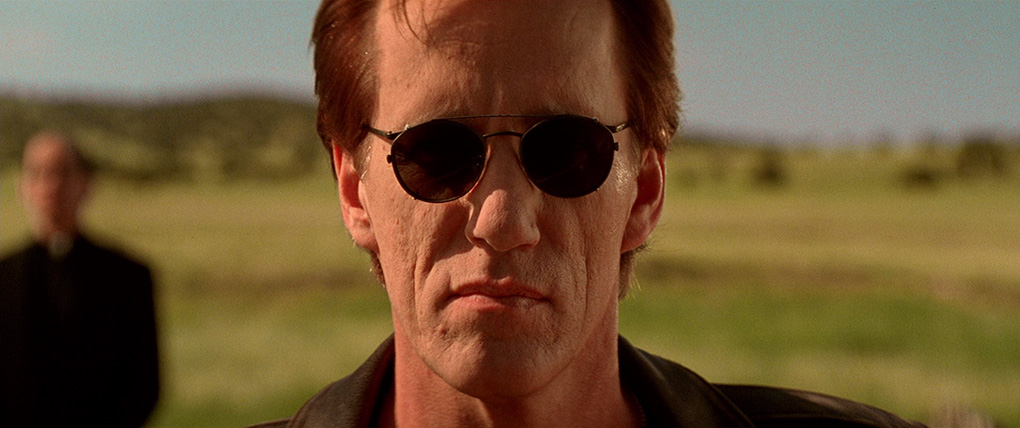
With their task complete, the boys head to a motel to party with local prostitutes, while Crow expresses concern to his beefy second-in-command Anthony Montoya (Daniel Baldwin) that the raid revealed no trace of a Master, a kind of über-vampire who effectively leads the pack. His concerns prove well founded when the goth-attired Valek (Thomas Ian Griffith), who it turns out is the almost indestructible Master of Master Vampires, shows up at the motel and lays waste to everyone except Crow and Montoya, who escape with the freshly bitten Katrina (an excellent Sheryl Lee), the aim being to use her telepathic contact with Valek to help them track him down and destroy him.
In spite of its titular subject matter, Vampires is less a straight-up horror tale than a horror-themed action movie, one whose set-pieces are primarily explosions of violent conflict in which tension is confined largely to "oh shit!" confrontations between vampires and would-be slayers, and is quickly resolved with a fist, a gun or a crossbow bolt. What gives the film its drive and distinctive identity is Jack Crow himself and the very personal nature of his high-stakes quest. Played with typically wiry intensity by James Woods, Crow has a hatred of vampires that stems from the death of his parents at their hands and has grown to be every bit as savage as the creatures he is hunting, and woe betide any poor fool who even thinks about standing in his way. It's a character trait that is really unleashed after his team is slaughtered and he is saddled with clerical newcomer Father Guiteau (Tim Guinee) by their boss Cardinal Alba (Maximilian Schell). The two get off of to a seriously shaky start (Crow throws him out of their truck and puts a gun to his head, and later hits him over the head with a telephone), and when Guiteau refuses to reveal a Vatican secret that he has sworn to protect, Crow stuffs a towel into his mouth to stifle his screams and slashes his hand with a promise to do worse unless he spills the beans. Guiteau, of course, is there to learn some hard lessons about how to survive when you're up against creatures that religion offers no real protection against, and it's almost a given that sooner or later he'll learn how to use a gun and do something to earn Crow's grudging respect. Then again, with Montoya falling for the gradually deteriorating Katrina and disguising a bite that is eventually going to turn him as well, he's going to need to.
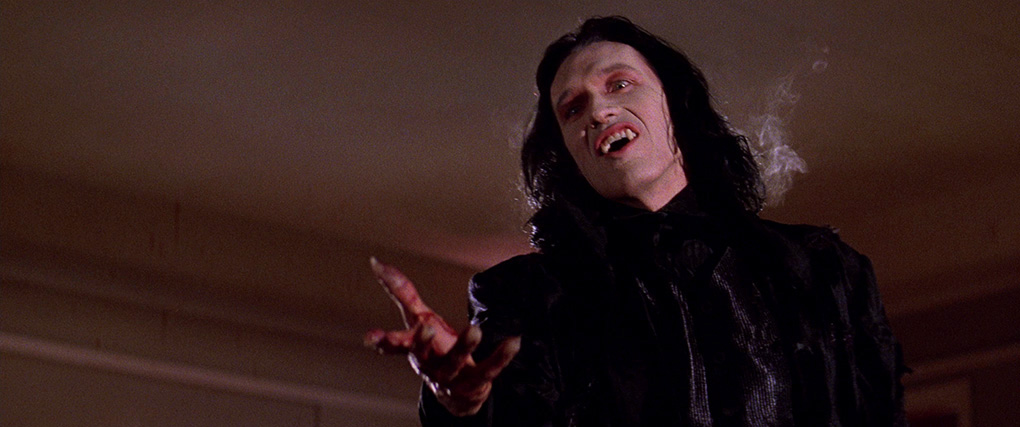
Word has it that Carpenter was on the verge of quitting filmmaking completely when he was contacted by Largo Entertainment about helming the project, which is based on the novel Vampire$ by John Steakley. Stylistically, it differs from the director's earlier works in the faster pace of the editing (Carpenter admits a Peckinpah influence, and on his commentary track describes the film as "The Wild Bunch meets Vlad the Impaler") and the unusual (and slightly distracting) use of dissolves during montage sequences. Carpenter's own blues-driven score harks back to his one for They Live and certainly works better than the hard rock thrash that overpowers the already noisy climax of his follow-up feature, Ghosts of Mars. And I can't be the only one who experienced a pang of recognition at the tinkling theme that has been lifted (albeit in a slightly modified form) from Goblin's astonishing work on Dario Argento's Suspiria.
It's been some while since I first watched Vampires, and one thing that did strike me this time around was how aggressively male a movie it is. Here, vampire hunting and slaying is a job for MEN, hard-ass roughnecks armed with sizeable weapons who slaughter by day and party hard with the local goodtime girls come nightfall. Helpful victim Katrina aside, women only feature in the story at all to be serviced by the menfolk or become targets for them when they are transformed into vampires, both of which paths lead to penetration of one sort or another. Even the occasional, Schwarzenegger-esque, pre-killing quips are largely reserved for the female vampires, from Crow's "Open wide, baby" before failing to fire an arrow into a snarling vampire's mouth to Montoya's cry of "How d'you like your stake, bitch?" after impaling another on a huge metal spear. I couldn't help wondering how long he'd been saving that one up for.
But as a don't-fuck-about, kick-ass, popcorn action movie, there's no doubt that Vampires delivers the goods. The conflict is muscular and furiously paced without ever falling headfirst into rapid-cut confusion, and the open plains and isolated encounters of the New Mexico locations (beautifully captured by Gary B. Kibbe's scope cinematography) can't help but recall those 50s science fiction classics that had my younger self convinced that just about anything could be living out in the American Badlands. And if you came for the violence then you'll not leave unbloodied, as bodies are graphically impaled, slashed and burned, and one poor sap is sliced clean in half by Valek's presumably scalpel-sharp fingernails and piston-strength arm.
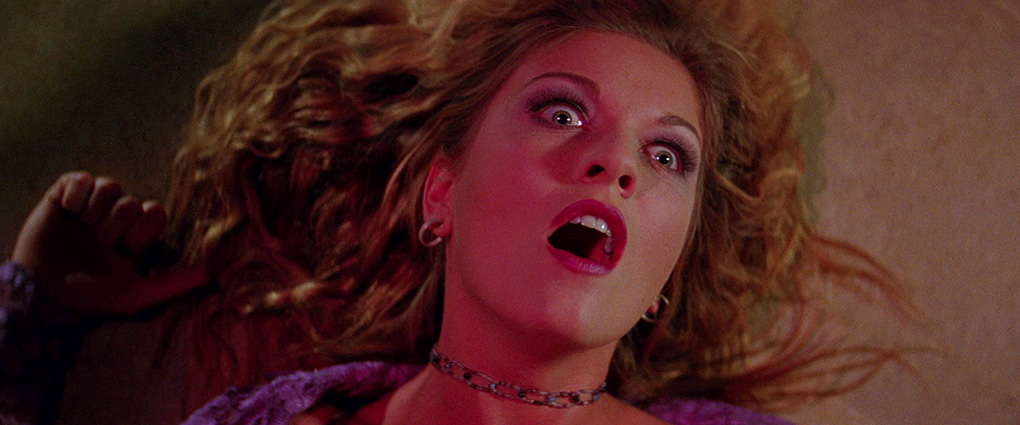
Despite its action bias, the film still delivers a couple of choice horror moments, the best of which has the waiting Valek spread-eagled on the ceiling of a motel room as the unsuspecting Katrina enters, which also serves as a welcome reminder of Carpenter's canny eye for camera placement and leads to a bite-seduction that foregoes the traditional jugular for somewhere altogether more intimate. And if a vampire movie (and despite all I've said, it still is a vampire movie) is judged in part for what it brings to rather than what it takes from the genre, then Vampires comfortably passes the entrance exam. The concept of organised bands of vampire slayers and overlord vampires known as Masters had already become part of genre lore via Joss Whedon's film and TV series, Buffy the Vampire Slayer (the first season of which began airing over a year before Carpenter's film hit cinema screens), but casting the slayers as a Vatican-sponsored and militarily armed group of seasoned adult professionals even now gives the film a distinctive edge. Best of all is its proposal for how vampires came to exist in the first place, something it would be unfair of me to reveal here but which puts an interesting slant not only with the genre's famed Catholic overtones and iconography, but this film's cheerful rejection of both.
Sourced from a high definition remaster from Sony supervised by Bill Karydes, the 2.40:1 1080p transfer on the Blu-ray in this set is absolutely pristine, being pin-sharp in its detail, with perfectly pitched contrast that nails the black levels without sucking in picture detail even at night or in darker interiors, thanks in part because they were so effectively lit in the first place. The colour is spot on, with lush reproduction of the golden hues of the opening scene, subtle rendering of the sunburnt hue of the exteriors and no hint of distracting oversaturation. There's not a dust spot or whiff of damage anywhere. Lovely.
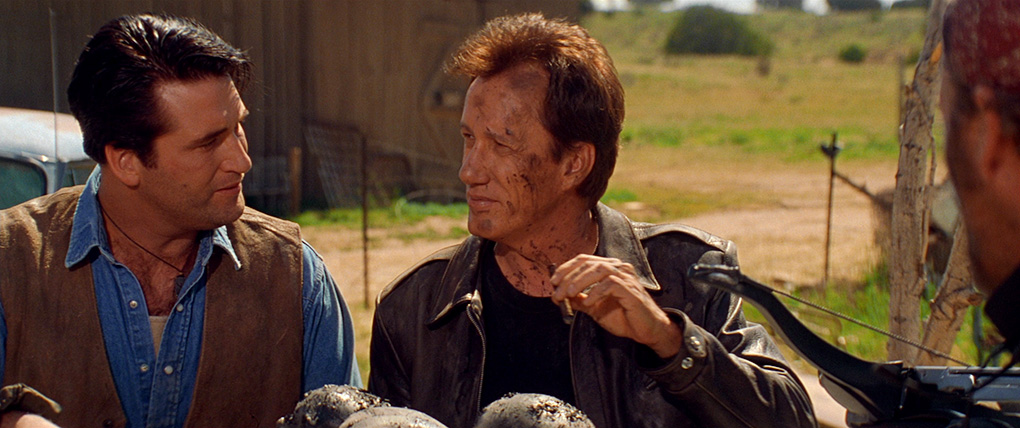
There's a choice between Linear PCM 2.0 stereo, which I'm guessing is the original mix, and a DTS-HD Master Audio 5.1 surround remix. Both are clear in their reproduction of dialogue, effects and music and free of any background hiss or damage. The DTS-HD track, however, leaves the stereo track standing, being brighter, louder and with a far more expansive dynamic range, particularly evident in the far beefier bass and cleaner trebles in the music and effects. Frontal separation is clear, and the use of surrounds for ambient effects subtle but very effective.
There's also an isolated score, which is linear PCM 2.0. This one is busier than many such tracks thanks to the range and quantity of music used in the film, though as usual you will have some waiting around between tracks.
Optional English subtitles for the deaf and hearing impaired are also included.
Audio Commentary by John Carpenter
Carpenter's commentary tracks are almost always a treat, and despite occasionally just describing what's happening on screen, this one – which I'm pretty such has been sourced from the earlier DVD release of the film – is up to the director's usual standards. There's a lot covered here, from the technical to the anecdotal to information on the production, the actors and especially the score, which Carpenter had what he describes as a leisurely five weeks to compose and record as opposed to the three days he had on Halloween. He's happy to point out continuity hiccups, whether they be misdirected lines of sight or the mix of shots filmed at night or by (processed) daylight, and is happy to name the other films he has referenced or borrowed elements from. I learnt quite a bit here, and genuinely hadn't twigged that the man that Montoya steals a car from is played by Shawshank Redemption director Frank Darabont, who apparently begged Carpenter for a small role in the film.
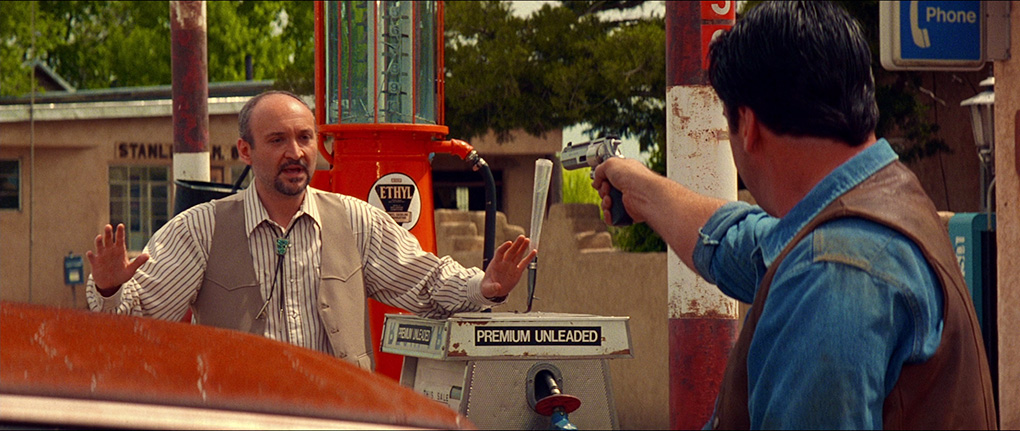
The Making of Vampires is actually a collection of short, standard definition EPK featurettes from the time of the film's release which can be played individually or as a single piece, although five of them have the very same tacky intro, which I quickly found myself fast-forwarding through. The first four are interviews and while too short to have any real substance, they do still have their moments: John Carpenter (2:10) outlines the story premise, talks about his approach to filmmaking and admits that this is probably as close as he'll get to directing a western; James Woods (2:25) also summarises the story and talks enthusiastically about the experience of working on the film; Daniel Baldwin (2:04) only has time to give us the premise; while Sheryl Lee (2:02) admits a lifelong fascination with vampires and concisely outlines how the vampire bite is linked to sex. Also in the section is B-Roll (8:39), a welcome if too-short collection footage of the shoot, while Behind the Scenes (6:10) has been constructed largely from snippets from the other featurettes in this section, although it does include more on the process of creating the vampire immolation, which I personally relished.
Theatrical Trailer (2:05)
A slickly assembled trailer whose spoilers are brief enough not to be an issue, unless you watch this immediately before the film.
John Carpenter: The Guardian Interview (Part 1) (38:27)
The best special feature here also has the potential to be the most frustrating. The interview itself was conducted at the BFI Southbank by Nigel Floyd back in 1994 when In the Mouth of Madness was being prepped for general release, and takes us on a hugely enjoyable journey through Carpenter's career up until that point. Well, sort of. Here, we only get as far as Christine, then the image fades to black to be replaced by a message that the second half is on Indicator's simultaneously released dual format edition of Ghosts of Mars. And trust me, you're going to want to see that second half. For hard-core Carpenter fans that's not going to be a problem, as they'll likely have pre-ordered both discs some time ago. But if, by chance, you're not a fan of Ghosts of Mars (and I'll save my own opinion for our upcoming review), then you're likely to be left feeling just a little ticked off. That said, the half included here is still something to treasure, with the always entertaining Carpenter answering questions on his time at the USC film school, his early script work ("you can make a career in Hollywood writing scripts that never get made," he assures us), how the British distributor's handling of and public response to Assault on Precinct 13 effectively launched his career, his first meeting with Donald Pleasance, the use of the Panaglide camera in Halloween, the hard lessons he learned on The Fog, working with actor Kurt Russell, the humour that no-one except him gets from The Thing, and plenty more. Apparently this was shot in standard definition (it is framed 4:3), but it looks terrific here.
Booklet
Another superb Indicator booklet kicks off with an excellent essay on the film by Kim Newman (I so enjoy reading Newman's always knowledgeable writing on a genre he is passionate about), who is also critical of the film's macho posturing and treatment of women. This is followed by an interview with Carpenter from Filmmaker magazine conducted by Jim Hemphill in October 2015, which usefully expands on some of the material found on the commentary track. Stills, film credits and brief info on the transfer is also included.
I remember enjoying Vampires when I saw it at the time of its cinema release, but nothing about it stayed with me the way so many scenes from every one of Carpenters early films did and still do, and coming back to the film after a gap of several years, I was thus surprised just how much I enjoyed it. The presentation on the Blu-ray of this dual format release is exemplary and the special features are well selected, even if you are teased a little by one of the best. Recommended, and a must-have for hard-core Carpenter fans.
|